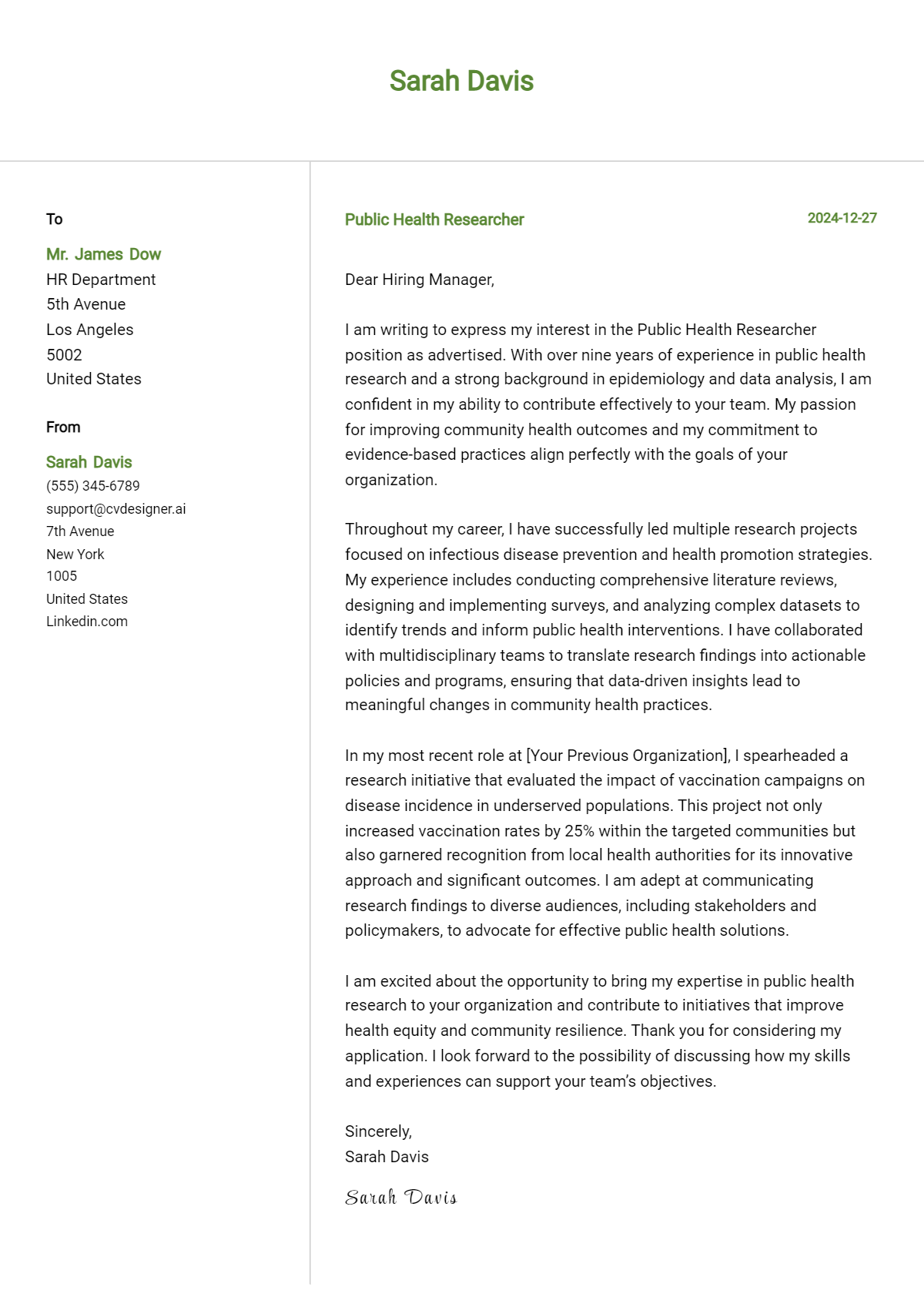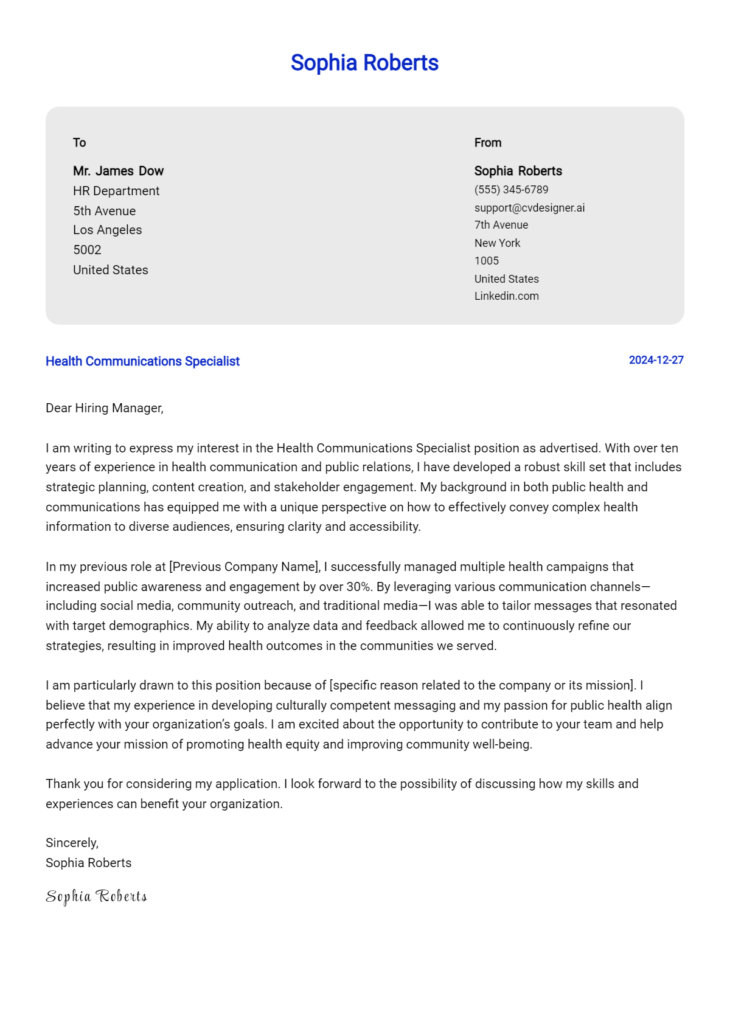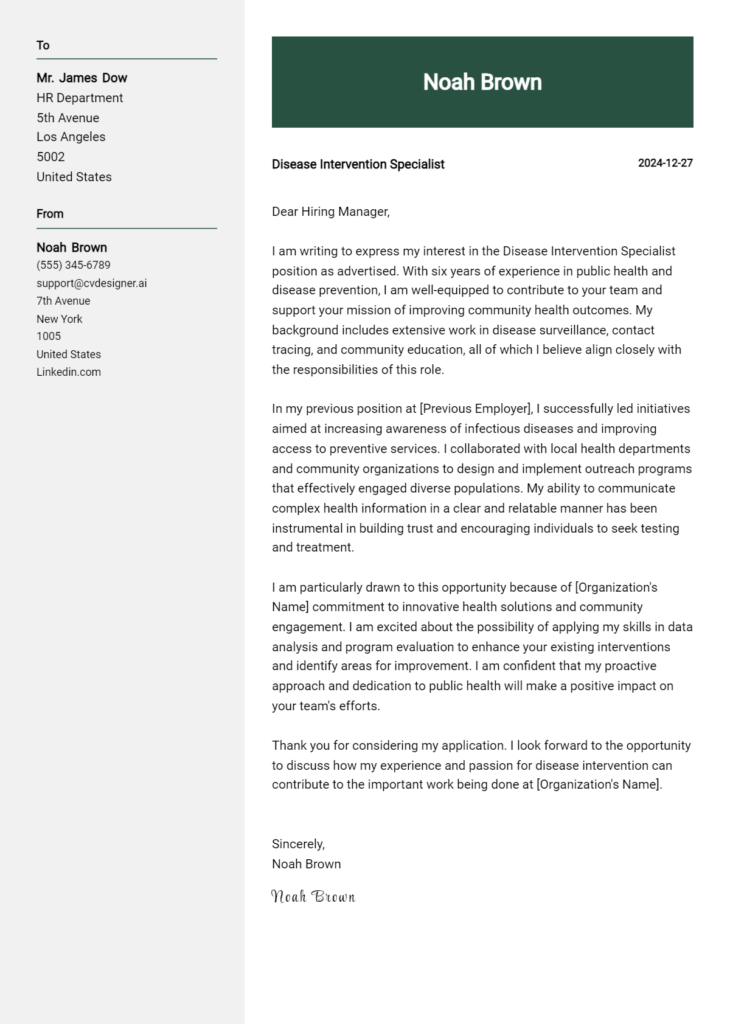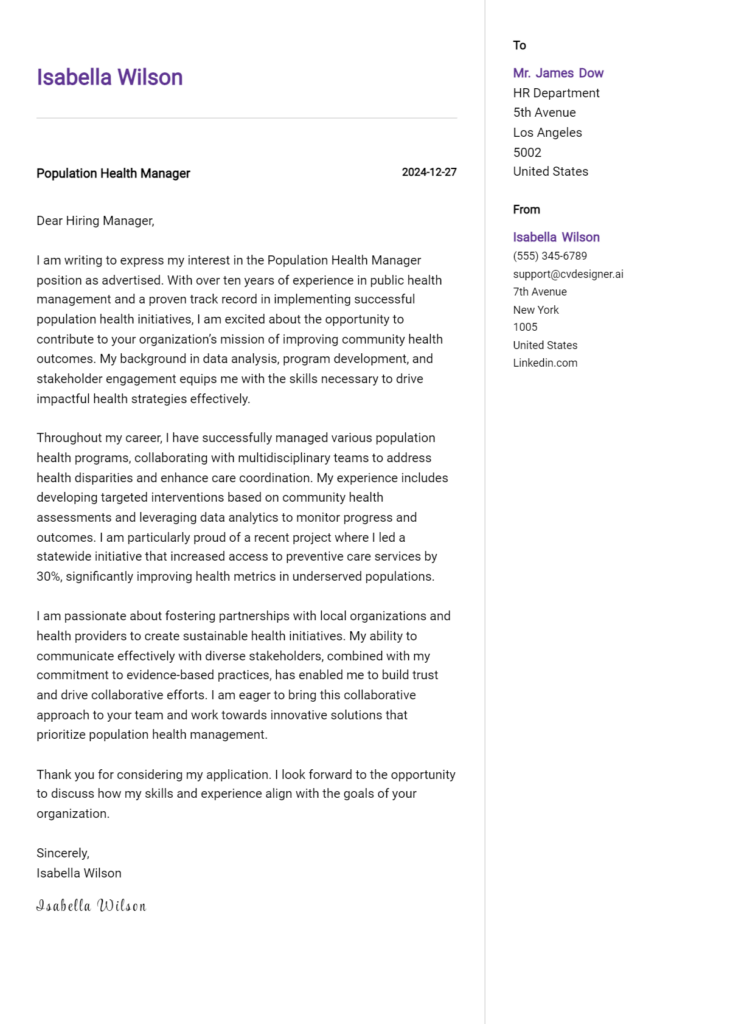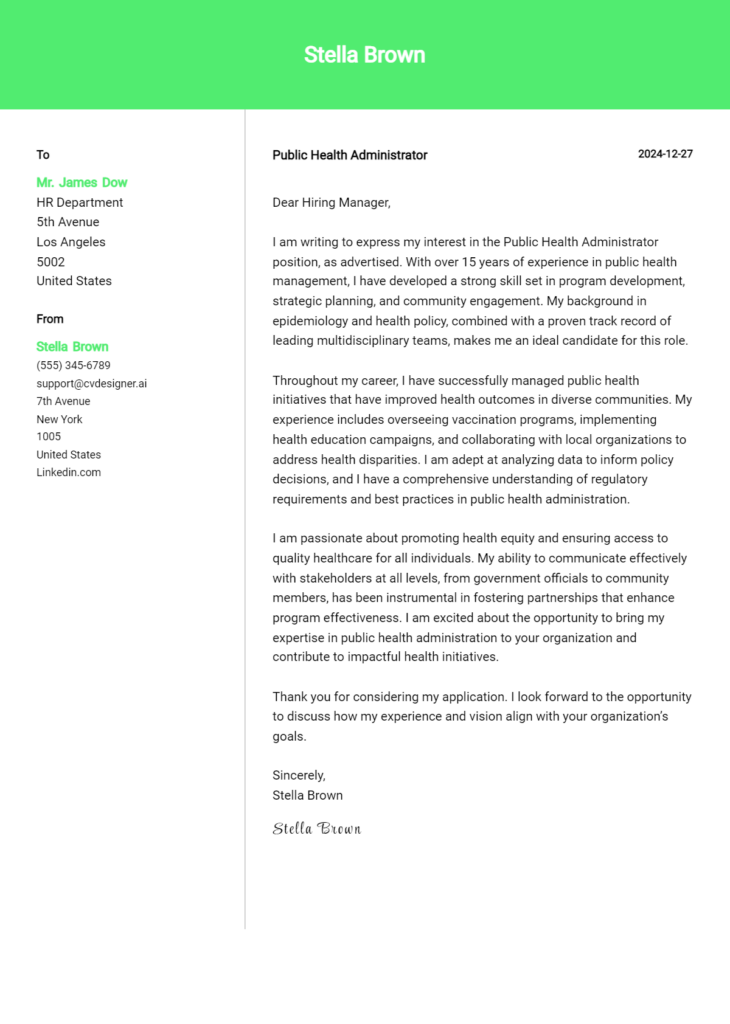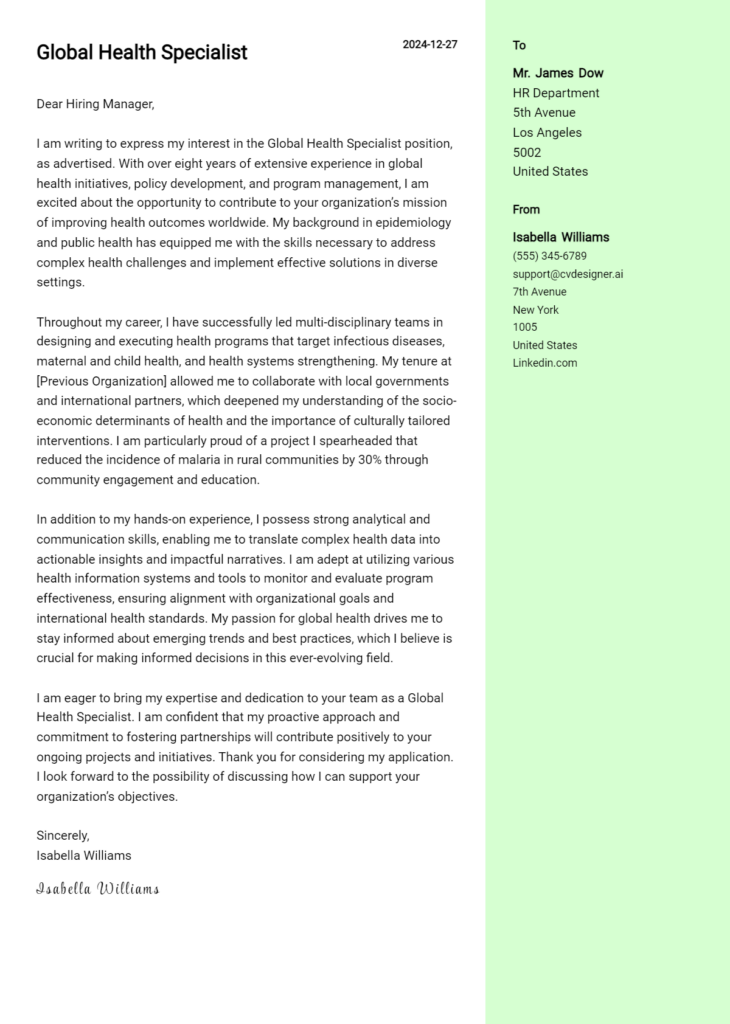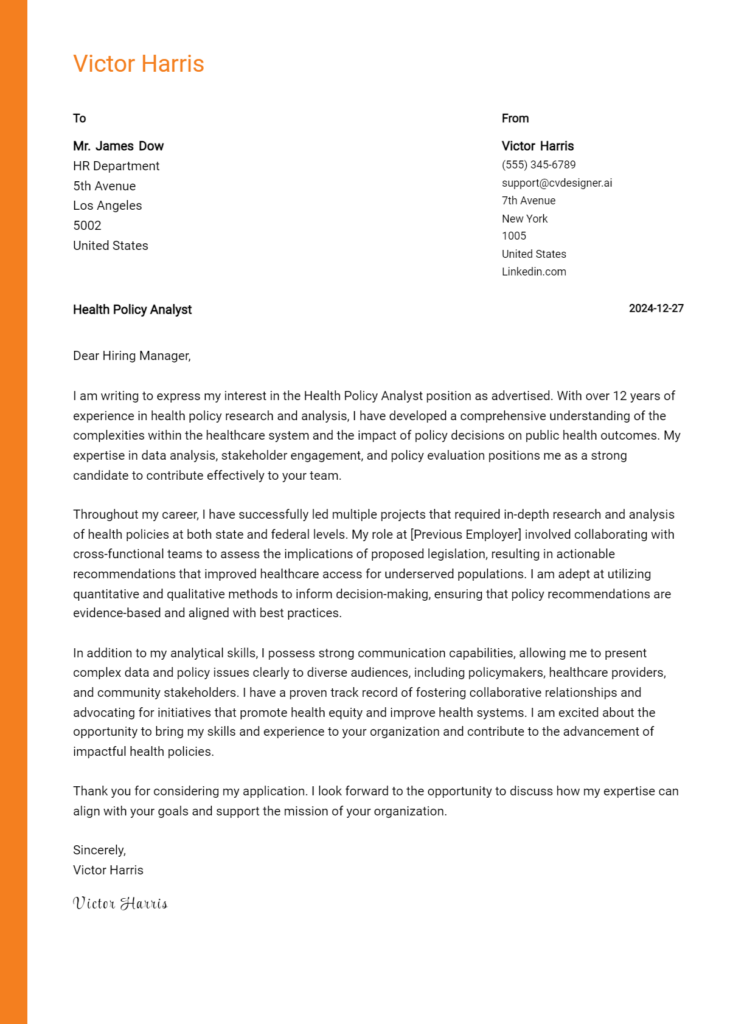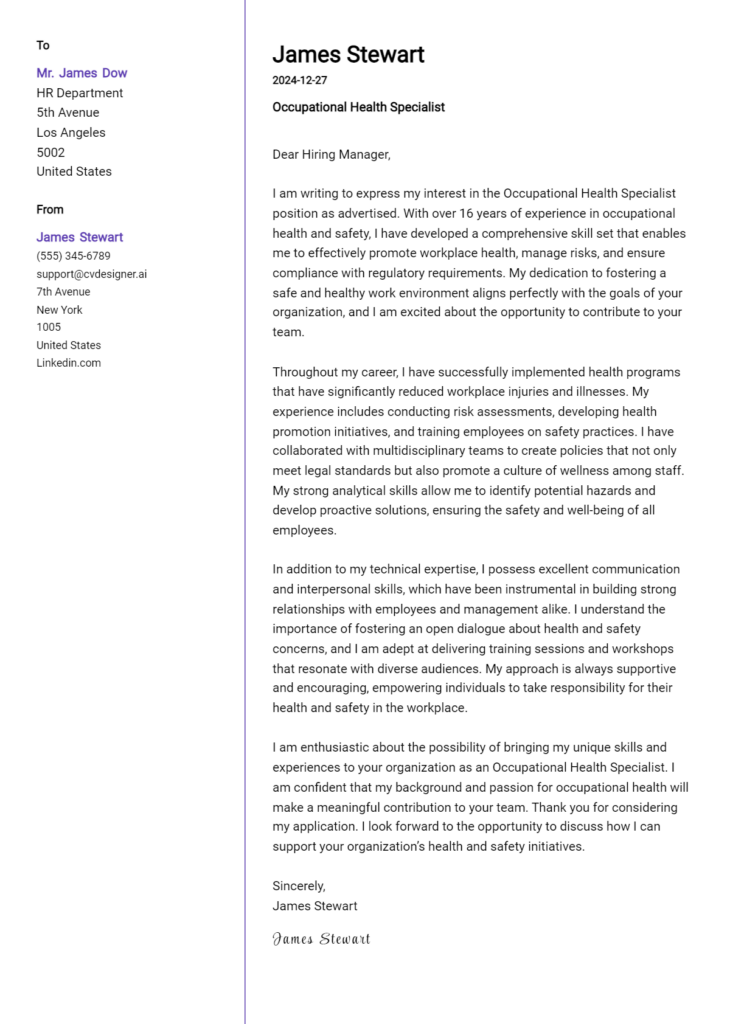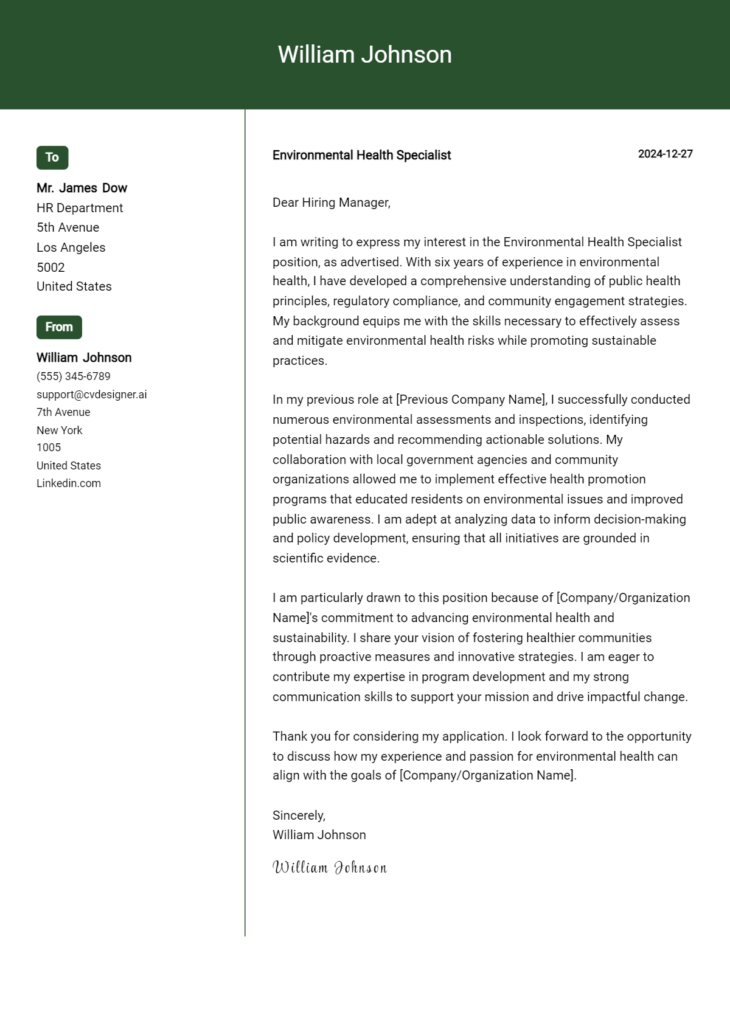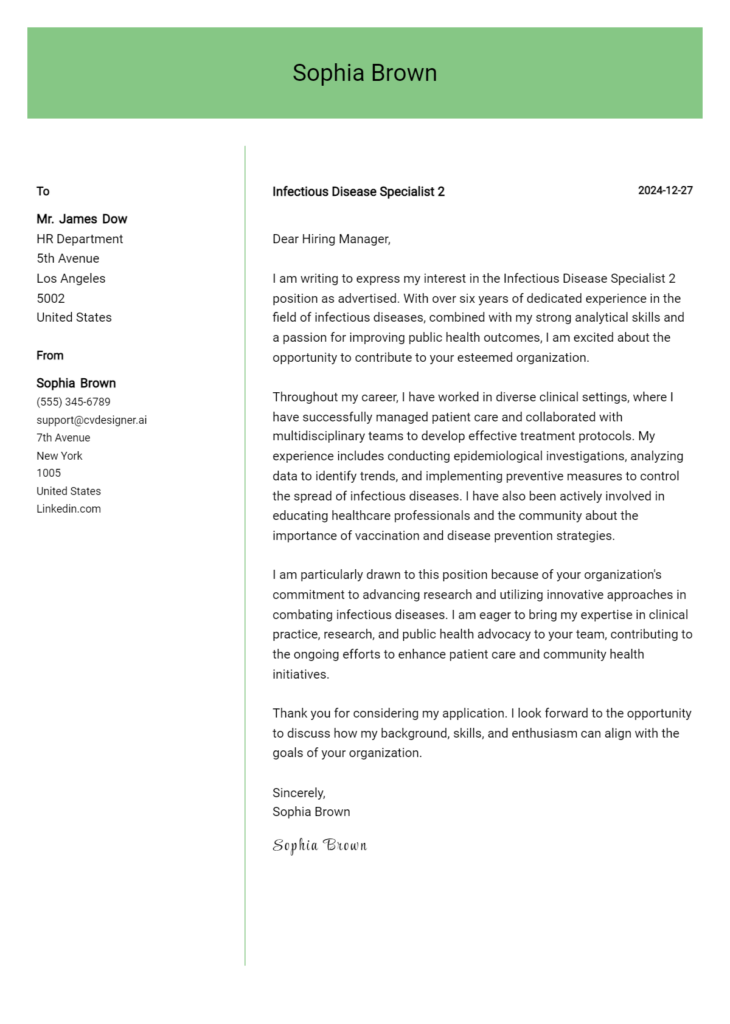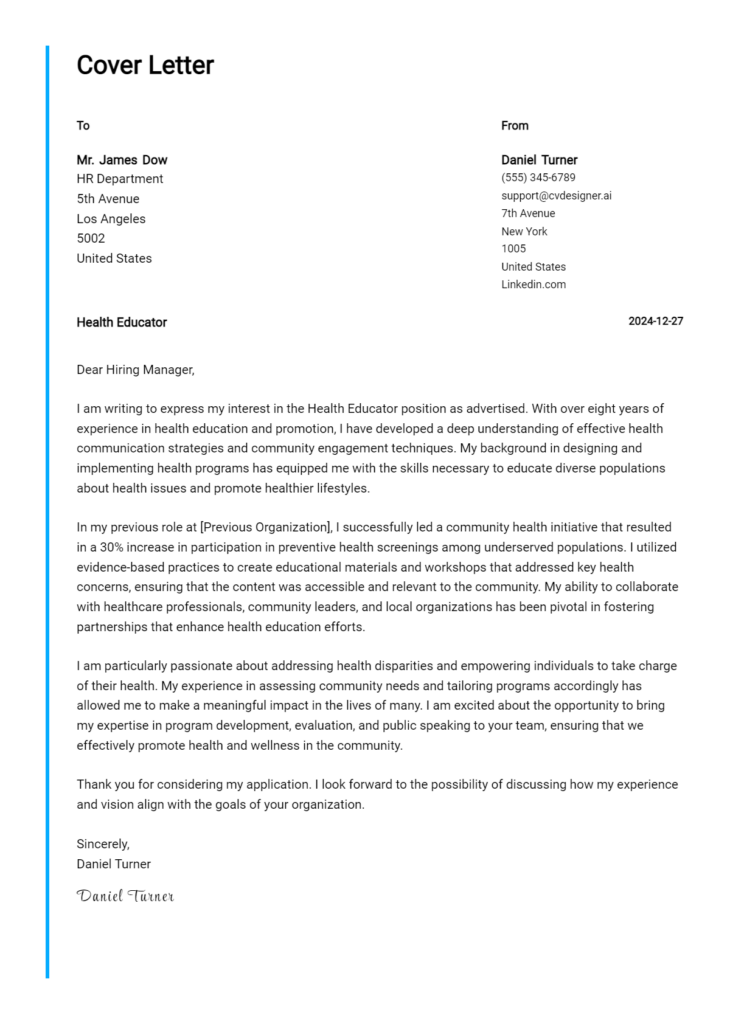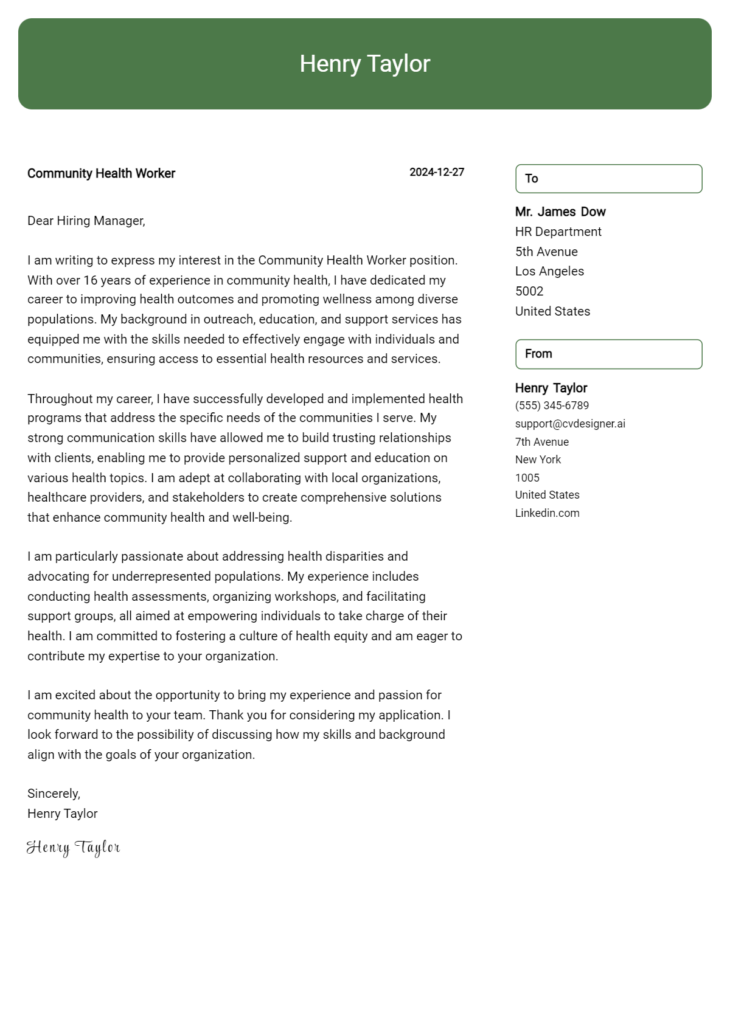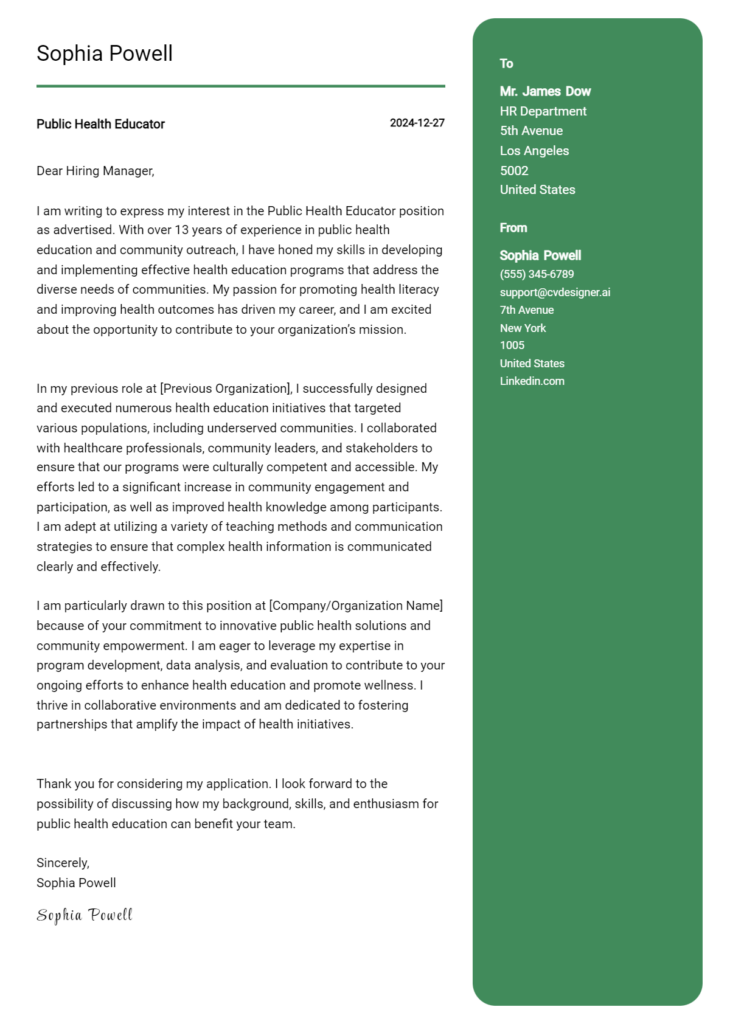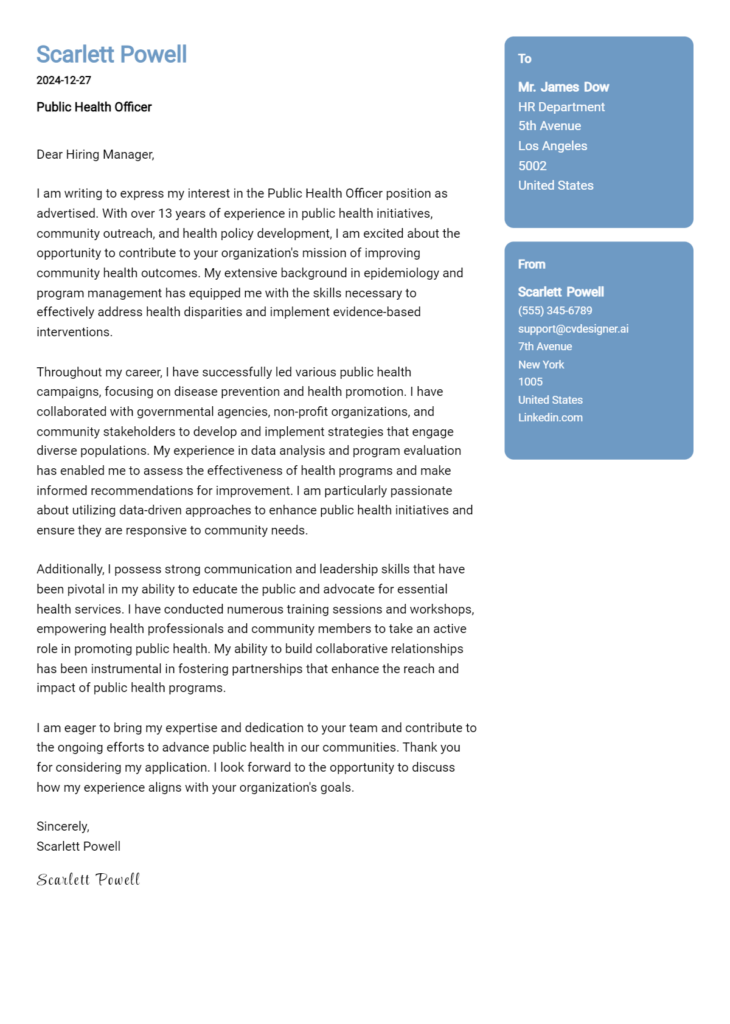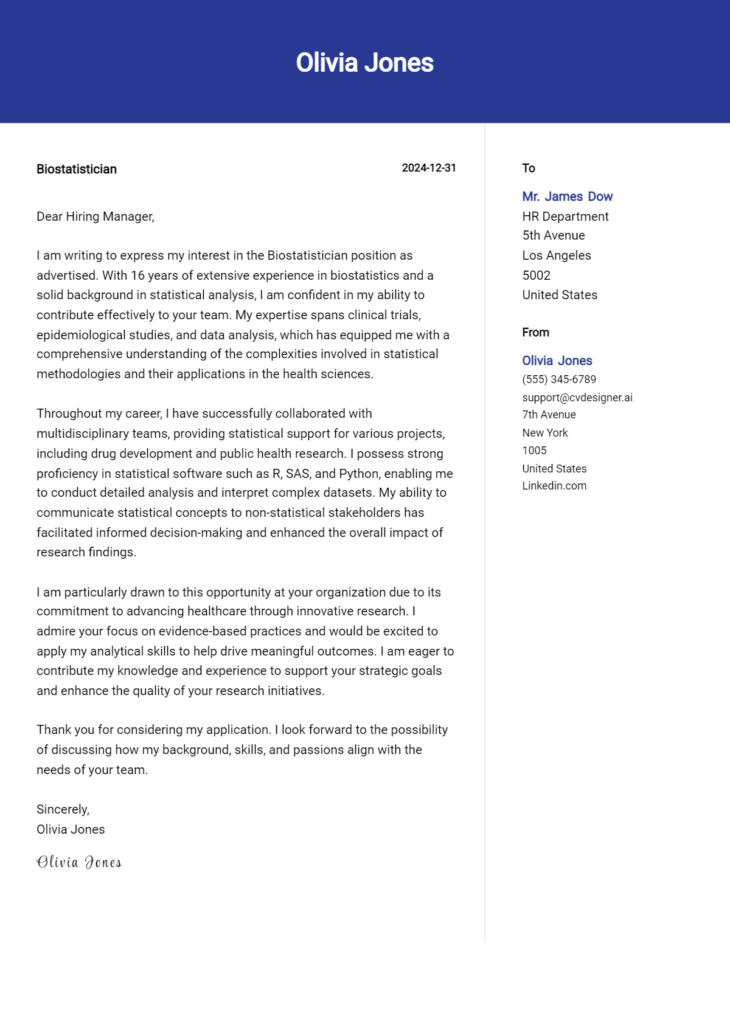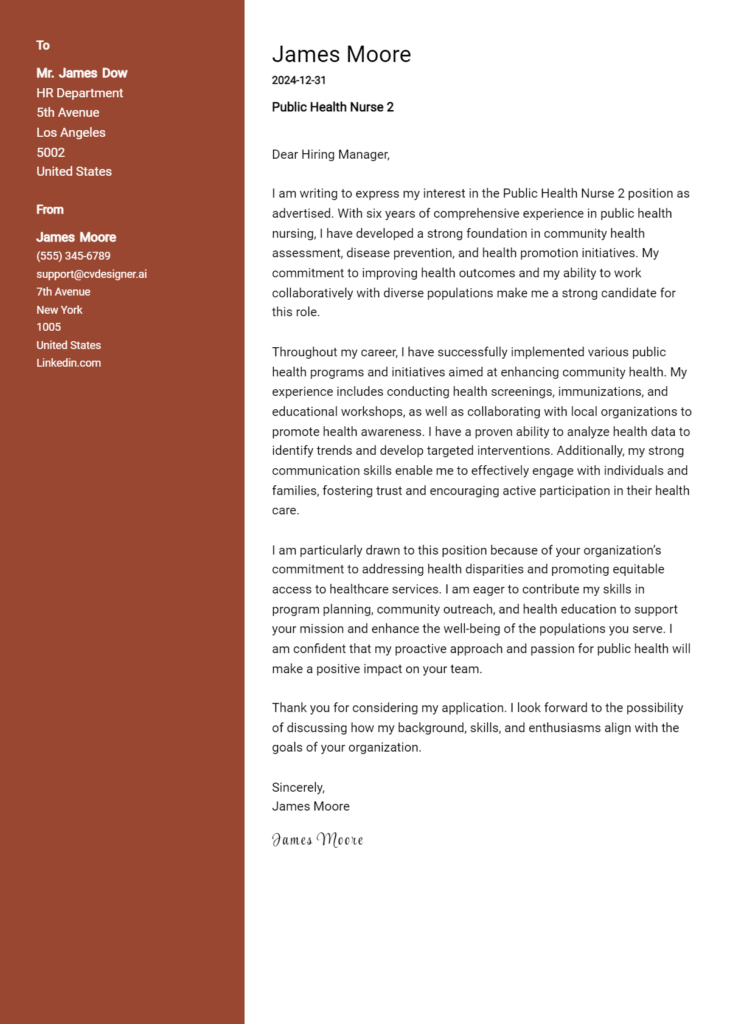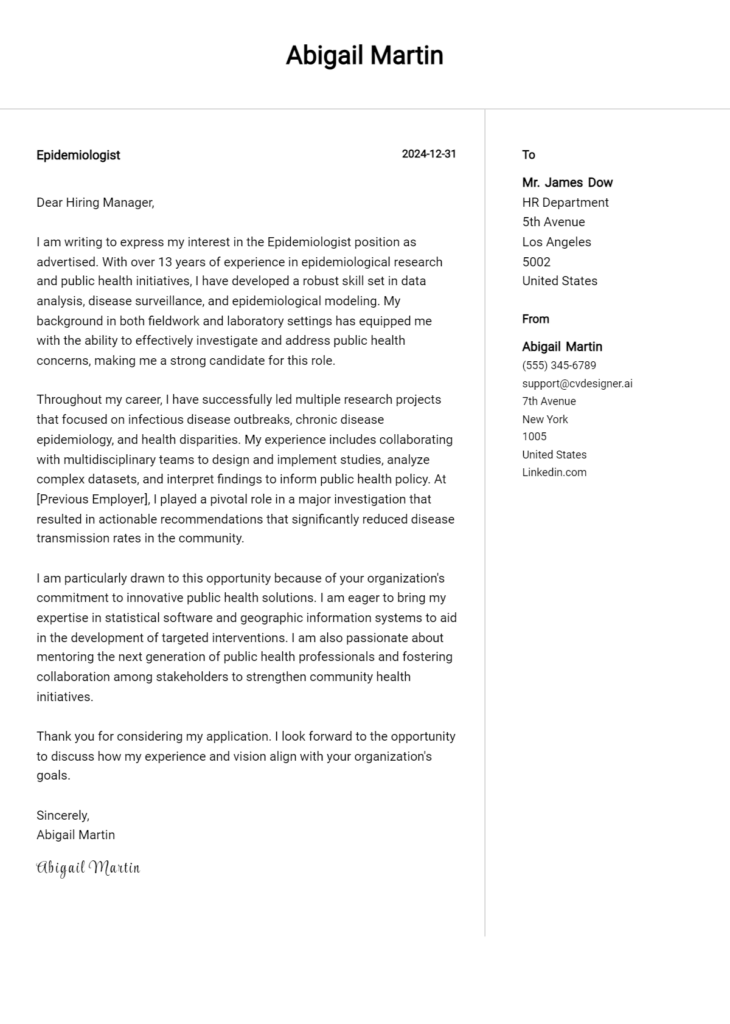Public Health Researcher Cover Letter Examples
Explore additional Public Health Researcher cover letter samples and guides and see what works for your level of experience or role.
How to Format a Public Health Researcher Cover Letter?
Crafting a well-structured cover letter is essential for a Public Health Researcher, as it serves as a window into your analytical abilities and commitment to public health initiatives. A well-formatted cover letter not only highlights your qualifications but also demonstrates your ability to communicate effectively—an indispensable skill in the field of public health. The organization and clarity of your cover letter can convey your meticulousness and passion for research, making a strong impression on hiring managers.
In this guide, we will discuss how to structure your cover letter, offering insights and examples tailored specifically for public health researchers.
We will focus on the essential components of a professional cover letter, including:
- Cover Letter Header
- Cover Letter Greeting
- Cover Letter Introduction
- Cover Letter Body
- Cover Letter Closing
Each section is crucial for showcasing your qualifications and professionalism. Let’s delve into each part and explore how to make your public health researcher cover letter stand out.
Importance of the Cover Letter Header for a Public Health Researcher
The header of a cover letter is a crucial element that sets the tone for the entire document. It serves as the first point of contact between the applicant and the potential employer, establishing professionalism and clarity. A well-structured header should include the applicant's contact information, the date, and the recipient's details, ensuring that all necessary information is easily accessible. This clarity not only reflects the applicant’s attention to detail but also their understanding of professional communication standards, which is particularly important in the field of public health research.
A strong header conveys confidence and organization, while a weak header can create confusion and diminish the applicant's credibility. Below are examples of a strong and a weak cover letter header for a Public Health Researcher.
Strong Example
Jane Doe 123 Health St. Cityville, ST 12345 (123) 456-7890 jane.doe@email.com March 15, 2023 Dr. John Smith Director of Public Health Research Health Institute 456 Research Ave. Cityville, ST 67890
Weak Example
Jane March 15 To Whom It May Concern,
The Importance of the Cover Letter Greeting
The greeting of your cover letter serves as the first impression for the hiring manager, setting the tone for the rest of your application. A well-crafted greeting demonstrates professionalism and shows that you have taken the time to personalize your application, which can differentiate you from other candidates. Addressing the hiring manager directly not only establishes a rapport but also indicates your genuine interest in the position. To avoid generic greetings that can make your letter feel impersonal, it's beneficial to research the recipient's name if possible. This shows initiative and attention to detail, which are essential traits for a Public Health Researcher.
Strong Greeting Example
Dear Dr. Jane Smith,
Weak Greeting Example
To Whom It May Concern,
The Importance of a Well-Crafted Cover Letter Introduction for a Public Health Researcher
A well-crafted cover letter introduction is crucial for a Public Health Researcher as it sets the tone for the entire application. This opening paragraph not only needs to capture the hiring manager's attention but also express the candidate’s genuine interest in the role. Furthermore, it should succinctly highlight key skills or achievements that align with the job requirements, making a strong case for why the candidate is an ideal fit. A compelling introduction can distinguish a candidate from others and pave the way for a more in-depth discussion of their qualifications.
Strong Example
Dear [Hiring Manager's Name], I am excited to apply for the Public Health Researcher position at [Organization Name], as I am passionate about advancing community health through data-driven research. With over five years of experience in epidemiological studies and a proven track record of publishing impactful findings in peer-reviewed journals, I am eager to bring my analytical skills and innovative approach to your esteemed team. I am particularly drawn to [Organization Name]’s commitment to addressing health disparities, and I am enthusiastic about the opportunity to contribute to meaningful projects that improve public health outcomes.
Weak Example
To whom it may concern, I am writing to apply for the Public Health Researcher job. I have a degree in public health and some experience in research. I think I could do well in this position. I have a couple of skills that might be useful, and I hope to hear back.
Purpose of the Cover Letter Body for a Public Health Researcher
The body of a cover letter for a Public Health Researcher serves as a vital platform for candidates to articulate their qualifications, relevant experiences, and the unique value they bring to an organization. This section should highlight specific projects or accomplishments that demonstrate the applicant's expertise in public health research, such as successful epidemiological studies, community health initiatives, or data analysis projects that led to significant health outcomes. By providing concrete examples of past work, candidates can effectively showcase their ability to contribute to the organization's goals, making a compelling case for their candidacy.
Strong Example
Dear Hiring Manager, I am excited to apply for the Public Health Researcher position at XYZ Health Institute. In my previous role at ABC Research Center, I led a groundbreaking study on the effects of air quality on respiratory health, which resulted in a policy change that improved air quality standards in our city. My team and I collected and analyzed data from over 5,000 participants, and our findings were published in the Journal of Public Health. Additionally, I have experience in community outreach, having developed a health education program that increased participation in preventive health screenings by 30% among underserved populations. I am eager to bring my expertise in research methodology and my passion for public health to your team.
Weak Example
Dear Hiring Manager, I am writing to apply for the Public Health Researcher position. I have a degree in public health and have worked in various research roles. I think I would be a good fit for your organization because I like public health. I have done some projects in the past, but they weren't very significant. I am interested in working with your team and hope to contribute in some way.
Importance of the Cover Letter Closing for a Public Health Researcher
The closing paragraph of a cover letter is crucial for leaving a lasting impression on the hiring committee. It serves as a final opportunity to succinctly summarize your qualifications, express enthusiasm for the role, and encourage the next steps in the hiring process, such as reviewing your resume or scheduling an interview. A strong closing can reinforce your fit for the position and demonstrate your proactive attitude, while a weak closing may fail to inspire action or convey your genuine interest.
Strong Example
Thank you for considering my application for the Public Health Researcher position. I am excited about the opportunity to contribute to your team with my expertise in epidemiology and my passion for addressing public health challenges. I believe my experience in data analysis and community outreach aligns well with the goals of your organization. I look forward to the possibility of discussing how I can support your mission in an interview. Please find my resume attached for your review.
Weak Example
Thanks for reading my cover letter. I hope you like my qualifications. I think I could be good for this job. Please let me know if you want to talk more, or just look at my resume.
These tips will help candidates craft an effective cover letter for a Public Health Researcher position. An impactful cover letter is essential to stand out in a competitive field where technical skills, problem-solving abilities, knowledge of the Software Development Life Cycle (SDLC), teamwork, and a passion for continuous learning are highly valued. Below are five detailed tips to assist you in developing a compelling cover letter.
Tips for Writing an Effective Cover Letter
Highlight Your Technical Skills
Clearly articulate your technical competencies relevant to public health research, such as data analysis, statistical software proficiency, and familiarity with epidemiological methods. Use specific examples to demonstrate how these skills have contributed to past projects or research initiatives. Tailoring this section to match the specific requirements of the job listing can significantly enhance your appeal.Demonstrate Problem-Solving Abilities
Public health research often involves addressing complex issues. Share instances where you identified a problem, developed a strategy, and implemented a solution successfully. Quantify your achievements where possible, as this adds credibility to your narrative and emphasizes your ability to navigate challenges effectively.Showcase Your Knowledge of SDLC
If applicable, discuss your understanding of the Software Development Life Cycle and how it relates to public health research. Mention any experience you have working with software development teams or contributing to projects that involved data management systems. This demonstrates your ability to integrate technical processes with public health initiatives.Emphasize Teamwork and Collaboration
Public health research is rarely a solo endeavor. Highlight your experience working in multidisciplinary teams, focusing on your ability to communicate effectively and collaborate towards common goals. Provide examples that illustrate your role in fostering a positive team environment and achieving successful outcomes through joint efforts.Express a Passion for Continuous Learning
The field of public health is constantly evolving, and a commitment to ongoing education is crucial. Mention any relevant courses, certifications, or workshops you've undertaken to stay updated with the latest trends and methodologies. This showcases your proactive approach to personal and professional growth, making you a more attractive candidate to potential employers.
By following these tips, you can create a compelling cover letter that effectively communicates your qualifications and enthusiasm for a Public Health Researcher role. For additional guidance, consider using cover letter templates or a cover letter builder to help structure your content.
Common Mistakes to Avoid in a Public Health Researcher Cover Letter
Crafting an effective cover letter is essential for standing out in the competitive field of public health research. Avoiding common mistakes can significantly enhance your chances of making a positive impression. Here are some typical pitfalls and tips for steering clear of them:
Generic Content: Using a one-size-fits-all cover letter can make you appear uninterested. Tailor your letter to the specific position and organization by incorporating relevant details from the job description.
Lack of Specificity: Failing to provide concrete examples of your skills and experiences can weaken your application. Use specific instances of your research contributions to demonstrate your expertise.
Ignoring Formatting Guidelines: Neglecting proper cover letter format can undermine your professionalism. Follow a clear structure, as outlined in our cover letter format, to ensure readability.
Overly Long or Short Letters: A cover letter that is too lengthy may lose the reader's interest, while one that is too brief might not convey enough information. Aim for a concise yet comprehensive overview of your qualifications.
Spelling and Grammar Mistakes: Typos can create a negative impression. Proofread your letter carefully and consider using tools or asking someone else to review it.
Failure to Highlight Relevant Skills: Not emphasizing skills pertinent to public health research can be detrimental. Focus on key competencies like data analysis, research methodology, and statistical software proficiency.
Neglecting a Strong Conclusion: A weak closing can leave a lackluster impression. End with a strong statement about your eagerness to contribute to the organization and a call to action for further discussion.
By avoiding these common mistakes and following guidelines, including reviewing cover letter examples, you can create a compelling cover letter that sets you apart as a candidate in public health research.
Cover Letter FAQs for Public Health Researcher
What should I include in my cover letter for a Public Health Researcher position?
In your cover letter, focus on your relevant experience, skills, and passion for public health. Start with a strong introduction that highlights your interest in the specific position and organization. Include details about your academic background, such as degrees or certifications related to public health. Discuss any relevant research experience, methodologies you are proficient in, and specific projects that showcase your skills. It’s also beneficial to mention your ability to analyze data, your understanding of public health issues, and your experience with community engagement. Conclude with a statement on how your values align with the organization's mission, and express your eagerness to contribute to their goals.
How can I tailor my cover letter for a specific job?
To tailor your cover letter, start by researching the organization and the specific job description. Identify key responsibilities and required skills mentioned in the posting. Use this information to highlight your relevant experiences and qualifications that align closely with the position. For instance, if the job emphasizes statistical analysis, mention your experience with statistical software and relevant projects. Additionally, refer to any specific public health issues the organization focuses on and how your background equips you to address these challenges. Personalizing your cover letter not only demonstrates your enthusiasm for the role but also shows that you have taken the time to understand the organization’s needs.
How long should my cover letter be?
Your cover letter should ideally be one page long, encompassing three to four paragraphs. Begin with a concise introduction that captures the reader's attention and states your purpose. The body should detail your qualifications and experiences relevant to the position, organized in a clear and logical manner. Each paragraph should focus on a specific aspect of your background or skills. Finally, wrap up with a strong conclusion that reiterates your interest in the role and encourages further discussion. Keeping your cover letter succinct and well-structured ensures that hiring managers can quickly grasp your qualifications, making it more likely they will consider you for the position.
Should I include my research publications in my cover letter?
Yes, mentioning your research publications can enhance your cover letter, especially if they are relevant to the position you are applying for. Including a brief mention of your key publications demonstrates your expertise and credibility in the field of public health research. Provide a short overview of the research topics you have covered, emphasizing any that align with the organization's focus. You can also highlight the impact of your work, such as citations or contributions to public health policies. However, be careful not to overwhelm the reader with too many details; instead, consider including a link to your CV or portfolio where they can find more information if interested.
Build your Cover Letter in minutes
Use an AI-powered cover letter builder and have your letter done in 5 minutes. Just select your template and our software will guide you through the process.

